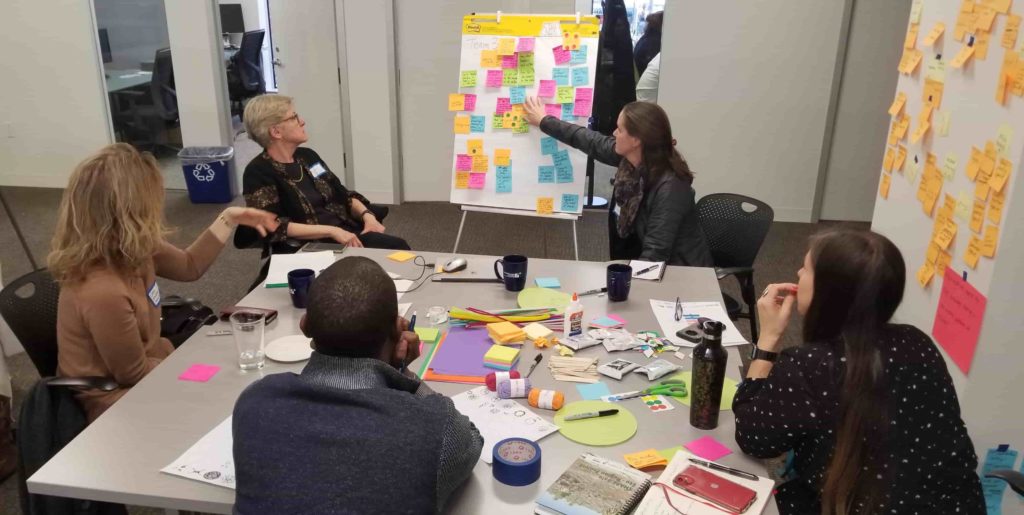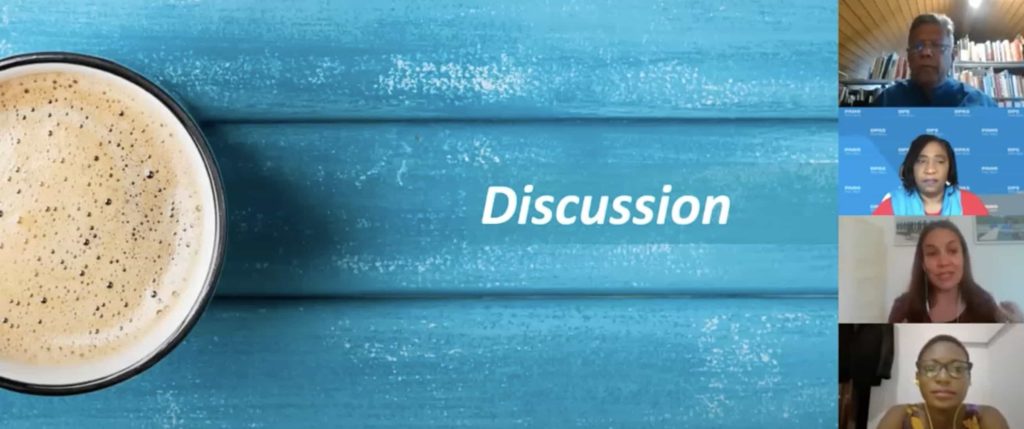Making Meaningful Connections in the Voluntary Family Planning Community

How can knowledge management (KM) build meaningful connections in voluntary family planning and reproductive health (FP/RH)? In this piece, we explore how Knowledge SUCCESS is using knowledge management to connect FP/RH professionals to experts, to each other, and to best practices that will improve their work.
The majority of voluntary family planning and reproductive health (FP/RH) professionals work for an organization that values a strong culture of knowledge sharing, according to research by our partners at the Busara Center for Behavioral Economics. Now more than ever, it’s important for our community to lean into that culture by forging connections and learning from one another. The Knowledge SUCCESS Partnerships Team is doing just that by implementing a range of tools and techniques that bring individuals and organizations together, connect them to experts, and help them find the essential knowledge they need to improve FP/RH projects and programs.
CONNECTING PROJECTS AND PROGRAMS TO BEST PRACTICES
When one group working in family planning has discovered a solution to a challenge that works, others can draw from that innovation and adapt it to their unique situation. This will save teams from investing in additional time, money, and resources. Knowledge SUCCESS is using knowledge management to amplify effective solutions and best practices for the FP/RH community.
COVID-19/Family Planning Task Team
As COVID-19 began to spread across the globe, the IBP Secretariat in partnership with Knowledge SUCCESS, led by the Johns Hopkins Center for Communication Programs, and the Research for Scalable Solutions (R4S) Project, led by FHI 360, formed a task team for IBP members to convene regularly and discuss family planning within the context of the pandemic. The goal is to ensure that FP/RH professionals have a space to share essential knowledge, best practices, and lessons learned that others can use to inform or adapt their project or program’s response to COVID-19.
“We first explored the need for a task team cautiously, to make sure our efforts were not duplicative of what others in the field were doing. IBP partners expressed a desire to exchange information specific to FP/RH, so we proceeded,” says Sarah Harlan, Knowledge SUCCESS Partnerships Team Lead, who co-chairs the task team alongside Nandita Thatte (IBP/WHO) and Trinity Zan (R4S/FHI 360). “However, we wanted to make sure it wasn’t overwhelming but helped streamline information. We defined clear parameters, focusing more on meetings and short documentation (in a spreadsheet) to share out challenges and successes, rather than writing anything too long or formal.”
CONNECTING FP/RH PROFESSIONALS TO EACH OTHER
Everyone working in family planning brings a unique set of strengths to the field. By using KM to build connections between individuals in the FP/RH community, Knowledge SUCCESS is creating opportunities for researchers, program implementers, policy makers, and advocates to combine their strengths, collaborate, and ideate with one another to solve common challenges.

Peer-to-Peer Learning
Peer assists and expert panels are approaches that Knowledge SUCCESS is using to create a customized learning experience between family planning professionals. Because financing for family planning emerged as a recurring theme at the FP2020 Francophone Regional Focal Point Workshop in Dakar, Senegal (March, 2020), FP2020 and Knowledge SUCCESS are connecting countries with experience in specific financing areas with those who need guidance as they begin a new activity.
The first activity in our peer assist series connected government, donor, and civil society representatives in Chad to those in Senegal with expertise on the Global Financing Facility (GFF).
“Senegal has made a lot of progress with GFF, and Chad has started the process but is encountering challenges—especially due to the COVID-19 pandemic. Chad wanted to hear Senegal’s experience to find new avenues that could help them move forward. As the facilitator of the activity, I was responsible for making sure both teams really had all of their expectations met,” explains Aissatou Thioye, the project’s KM Officer for Francophone West Africa.
The structured 90-minute conversation allowed Chadian Focal Points to present their challenge to Senegalese experts before delving into a back-and-forth of questions and answers. Thanks to the in-depth discussion, Chad is now equipped with key recommendations, lessons learned, and resources to improve financing for family planning in their country.
“Peer assists are a great way to spark a peer-to-peer relationship. Our hope is that the teams will continue to contact each other, and will no longer need to go through us. FP2020 Focal Points typically meet only once every year or two at annual workshops, but these peer assists are creating an opportunity for continuous conversations and less formal knowledge sharing,” adds Sarah Harlan.
The FP2020/Knowledge SUCCESS partnership is planning a peer assist in October between Nepal and experts in Sri Lanka to share learnings on postpartum implants. In addition, the partnership is organizing two rounds of expert panels (in English and French) where Rwanda will offer guidance on the business case for voluntary family planning with groups of country representatives from Francophone and Anglophone Africa.
Lastly, Knowledge SUCCESS held a peer assist to share insights with our partners at Amref Health Africa on how to form a Community of Practice (CoP) on Knowledge Management for FP/RH professionals in East Africa. Amref will draw on the project’s successes and lessons learned to realize its vision for a sustainable platform where CoP members can connect, collaborate, and share knowledge.
“Peer assists eliminate the ‘silo’ effect in programming and allow for close collaboration and technical support. It was great to see the whole Knowledge SUCCESS team chipping in towards building the CoP,” says Networks and Partnerships Manager Sarah Kosgei. “This session was unique in that it not only addressed our specific needs as a region but also recommended strategies for moving the knowledge management agenda within the CoP,” added Alex Omari, the project’s KM Officer for East Africa.

Online Platform for Population, Health, and Environment
The Population, Health, and Environment (PHE) community has identified a need to collaborate and engage with each other, and to share knowledge and experiences related to PHE policy, research, and implementation. As the community is spread out across the globe and in-person opportunities are costly and infrequent, the PHE community is looking for a virtual solution to meet this need.
The partnerships team hosted one in-person (Washington, DC) and two virtual co-creation workshops (Africa and Asia) that brought together professionals working on PHE projects across the globe to collaborate on potential solutions to this challenge, prioritize them, and develop low-fidelity prototypes of the solutions. Connecting a wide range of voices from the PHE community through a co-creation workshop series is ensuring that the solution will better reflect all stakeholder needs.
As a result of this co-creation workshop series, the partnerships team is preparing to develop an interactive online platform that connects PHE stakeholders to each other and to information related to their job. In order to provide the space for dialogue on PHE, the site will integrate a forum software that allows for engaged members to create their own discussions.
Global PHE and Knowledge Management champions will serve as content managers on the platform to ensure that the information and resources stay current as well as contribute to the sustainability of the management of the website. “We want to build a community around a feeling of motivation to share resources,” explains Activity Lead Elizabeth Tully.
CONNECTING INDIVIDUALS TO EXPERTS
Tacit knowledge is information learned by experience, and is often difficult to capture in written documents or resources. That means that FP/RH professionals can’t always find the information they need through a simple Google search. To overcome this challenge, Knowledge SUCCESS is connecting people directly, through thoughtful knowledge management approaches that give individuals the opportunity to learn a new skill or topic directly from others with that expertise.

Virtual discussions on Adolescent and Youth Reproductive Health
In response to an identified need from FP2020 Focal Points for expanded knowledge on timely topics in Adolescent and Youth Reproductive Health (AYRH), Knowledge SUCCESS and FP2020 co-created the virtual Connecting Conversation series. Over 2,000 people registered for the first five sessions, which set the stage for understanding and investing in AYRH, provided a historical overview of AYRH, and explored the powerful role that social norms play in influencing youth behaviors and health outcomes, among other topics.
AYRH is a broad field with various components, and this learning module framework allows invited experts to offer participants a closer look at these very specific topics throughout the course of the year. “Unlike a one-off webinar, the comprehensive Connecting Conversations series provides space to unpack big questions and complicated issues, make connections between topics, and demonstrate how different aspects of the field are integrated with one another,” explains Brittany Goetsch, activity lead for the series.
Sessions open with a brief, ten-minute expert overview to set the stage before transitioning into an open, interactive discussion between experts and participants. Participants have joined from over 30 countries across the globe to pose thoughtful questions and contribute meaningfully to the lively conversation.
The learning is a two-way street. Participants who attend multiple sessions are able to make connections between topics, offering experts new insights and perspectives on previously covered subjects. Experts are also expanding their own knowledge of the AYRH field by joining other sessions as participants themselves. In addition, the learning continues in between sessions as participants engage with resources, such as session recaps that include answers to lingering questions. The full recording is also made available on FP2020’s YouTube channel for those unable to attend the live session.
One-on-one Youth Mentorship Program
Knowledge SUCCESS is also taking a more personalized approach to capacity strengthening by partnering with International Youth Alliance for Family Planning (IYAFP) to help its members become more effective communicators in support of their mission and goals.
By pairing talented and motivated IYAFP Country Coordinators with experienced writers, editors, and graphic designers on the Knowledge SUCCESS team, the mentorship program aims to provide young AYRH advocates with the tools, skills, and resources they need to develop and promote powerful stories around youth leadership. Through strategic communications, IYAFP hopes to inform and engage passionate AYRH supporters while also reaching young people who may be less informed about issues that may have a deep impact on their lives.
In addition to one-on-one mentorship, Knowledge SUCCESS is organizing a skills-building webinar series that demonstrates to IYAFP Country Coordinators how they can leverage content creation and knowledge exchange at the organizational level.
Conclusion
In this work-from-home world, it’s easy to feel disconnected from our colleagues and from our typical pre-pandemic professional lives. Knowledge management gives us a set of tools and techniques that can help our community stay connected to one another and to essential knowledge that will ensure women and girls, couples and families around the world have continued access to voluntary family planning and reproductive health care.





